COVID-19

Stimulus Will Cut Black Child Poverty, Confirmation of Marcia Fudge: March 9 Joint Center Roundup
Biden Administation
Biden will likely sign COVID-19 relief bill this week: On Saturday the U.S. Senate passed the $1.9 trillion COVID-19 relief bill, and the House is scheduled to vote on the bill on “Wednesday morning at the latest” according to House Speaker Nancy Pelosi (D-CA). President Biden is slated to sign the legislation before unemployment programs expire on Sunday. The relief bill, also known as the American Rescue Plan, includes a $300 per week boost to unemployment benefits through September 6, direct payments of $1,400 to many Americans, expansion of child tax credit, rental payment assistance, funds for vaccine distribution and testing, and financial support for state and local governments and schools. See also CNN.
Stimulus will cut poverty among Black children by 50%: During the National League of Cities Conference, Vice President Kamala Harris acknowledges that relief distribution must be carried out equitably, as the pandemic only exacerbated the “the fissures and the flaws and failures” of the system. Harris says the American Rescue Plan will “lift one in three black and Latino Americans who are living in poverty and lift them out of poverty.” Democrats’ analysis of the proposal finds that the temporary $3,600 increase to the child tax credit will cut “child poverty among Black families by more than 50%” and view this legislation as “a fundamental rethinking of the way the country approaches child poverty.”
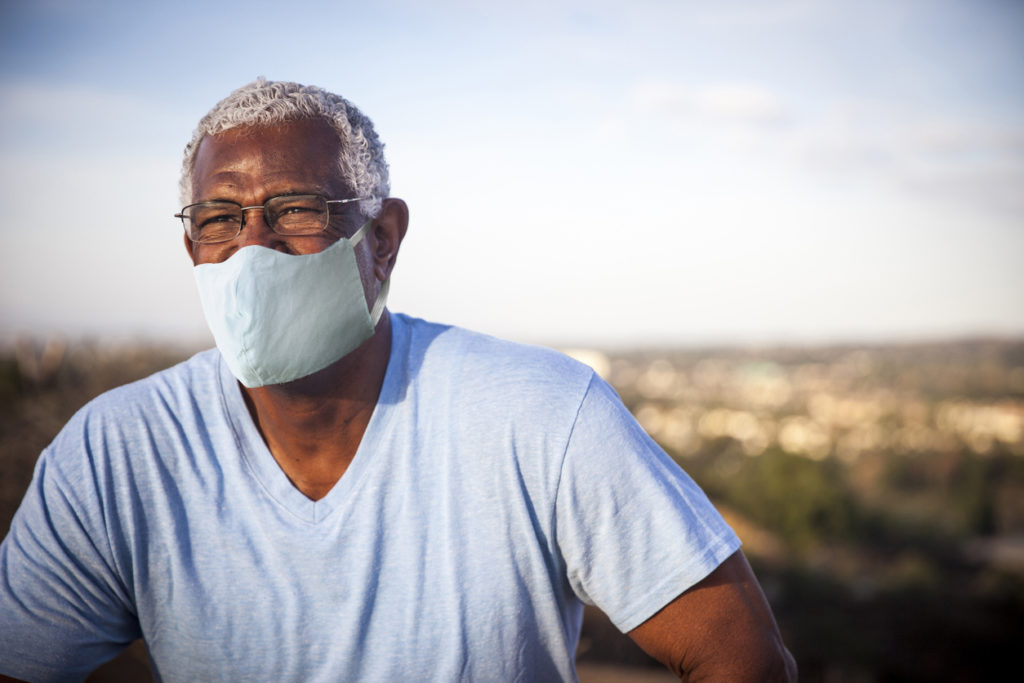
Relief for Black farmers: The COVID-19 relief bill includes $10.4 billion to support agriculture, approximately half of which will assist disadvantaged farmers (Black, Hispanic, Native American or Asian American farmers or ranchers with outstanding debt as of Jan. 1, 2021). The Washington Post notes that “about a quarter of disadvantaged farmers are Black” and the bill will fund “grants, training, education and other forms of assistance aimed at acquiring land.” Black Belt Justice Center Executive Director Tracy Lloyd McCurty called it “the most significant piece of legislation with respect to the arc of Black land ownership in this country” and described it as “reparations” for Black farmers.
Equitable vaccine distribution in Black communities: In a press briefing, the head of the White House’s COVID-19 health equity task force, Dr. Marcella Nunez-Smith, discusses equitable vaccine distribution and the importance of having vaccine distribution data disaggregated by race. During the briefing, she said “the share of vaccinations is significantly lower for Latino and non-Hispanic black individuals, relative to their share of the general population” and they “only have racial ethnicity data for 53 percent of those who have received their first dose of a COVID-19 vaccine.”
Biden’s executive orders on equity for Black women: On International Women’s Day, President Biden signed two executive orders promoting gender equity. The first order establishes a White House Gender Policy Council (it was formerly the White House Council on Women and Girls under President Obama and was disbanded under the Trump Administration), which the Council’s Co-Hair Jennifer Klein says intends to focus on “policies to advance equity for Black, indigenous and Latina women and girls of color.” The second order directs the Department of Education “to review all existing regulations to ‘[guarantee] an educational environment free from discrimination on the basis of sex, including discrimination in the form of sexual harassment, which encompasses sexual violence, and including discrimination on the basis of sexual orientation or gender identity.’”
President Biden signs orders to expand voting access: President Biden signed an executive order on the 56th anniversary of Bloody Sunday to “make it easier for eligible voters to register to vote and improve access to voting.” The executive order calls for Congress to restore the Voting Rights Act in honor of the late Congressman John Lewis, “calls for initiatives to improve access to voting for federal employees, active duty military and other voters overseas, and Americans in federal prison,” “directs federal agencies to increase voters’ access to registration and information on elections online, as well as through more regular distribution of vote by mail and voter registration applications,” and “calls for federal agencies to better coordinate with state governments on voter registration, as well as for updating the website Vote.gov.” The bill also calls for the passage of the For the People Act (H.R. 1), which is strongly supported by the Congressional Black Caucus. The bill includes automatic voter registration, an end to partisan gerrymandering, reformations of federal ethics rules, and more. CBC Chair Joyce Beatty said the importance of the bill “cannot be overstated.” The executive orders come after Georgia Republicans are pushing to pass “election integrity” bills that many say will suppress Black votes. The Georgia proposals would “limit mail-in voting access, add voter ID requirements and make it harder to get on or stay on the voter rolls.”
The Hill
House passes the George Floyd Justice in Policing Act: Last Wednesday, the House passed the George Floyd Justice in Policing Act, a bill that prohibits racial profiling, bans chokeholds and no-knock warrants, and much more (summary here). The bill now needs the support of at least 10 Republican Senators to pass the Senate. Former Congressional Black Caucus Chair former Chair Karen Bass (D-CA), who introduced the bill, is “confident that House members will be able to work with the Senate to get it passed.”
Senate considers Congresswoman Marcia Fudge (D-OH): Today, the Senate will consider the nomination of Congresswoman Marcia Fudge (D-OH) to serve as the Secretary of Housing and Urban Development under the Biden Administration. If confirmed, Congresswoman Fudge will be the second Black woman to lead the Department in American history.
Appointments
Joint Center & almost 30 Black orgs support Shalanda Young for OMB director: Last week, the Joint Center organized a letter signed by nearly 30 Black organizations–including the NAACP, National Action Network, the National Council of Negro Women, the National Urban League, and Delta Sigma Theta—urging President Biden to nominate Shalanda Young for Director of the White House Office of Management and Budget. If nominated and confirmed, Ms. Young would be the first woman of color to serve as OMB Director.
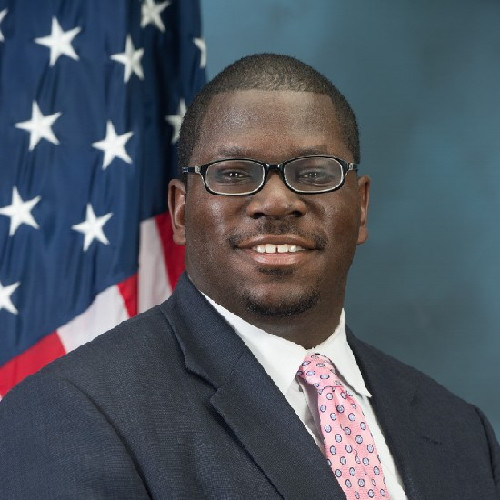
Biden appoints Donald K. Sherman as Special Assistant to the President for Racial and Economic Justice in the Domestic Policy Council. Mr. Sherman has previously served as the Chief Oversight Counsel to the late Rep. Elijah E. Cummings on the House Oversight Committee, and as Senior Counsel to Senator Clair McCaskill on the Senate Homeland Security and Governmental Affairs Committee

Biden appoints Edward Edney as a Senior Legislative Officer at the Department of Labor. Mr. Edney previously served as a Legislative Counsel for Federal Affairs in the Office of the Mayor in the City of Chicago. He has also worked on Capitol Hill as a legislative staffer for Senator Tammy Duckworth (D-IL), Representative Marcy Kaptur (D-OH), and the House Judiciary Committee.
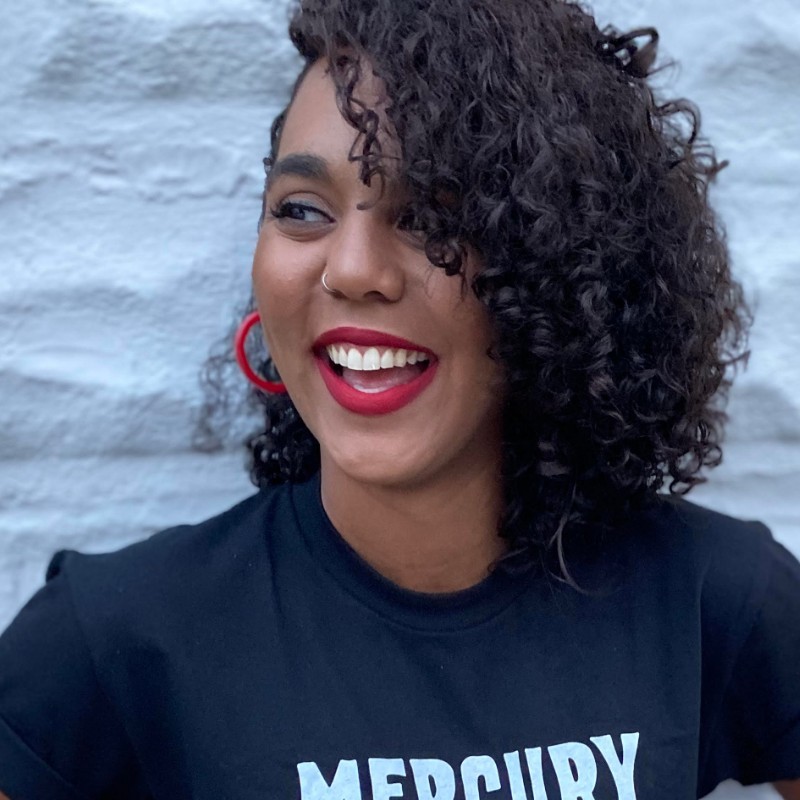
Biden appoints Kristen Slevin as the Director of Scheduling at the Department of Energy. Ms. Slevin previously served as the Deputy Director of National scheduling during Senator Elizabeth Warren’s presidential campaign.

Biden appoints Tahmika Ruth Jackson as Special Counsel at the Department of Veterans Affairs. Ms. Jackson previously served as a National Security Agency (NSA) senior representative to the National Counterterrorism Center. She has formerly represented the Department of Defense as an attorney in the NSA Office of the General Counsel, focusing on national security and intelligence law issues.
Economic Policy
Jobless claims tick up: Initial weekly unemployment claims rose slightly to 745,000 for the week ending Feb. 27, still up from the pre-pandemic record high of 695,000 set in 1982.
Unemployment rate ticks down: The overall unemployment rate dropped to 6.2 percent in February, but the Black unemployment rate rose to 9.9 percent (The rate fell to 5.1 percent for Asians, 8.5 percent for Latinas/os, and 5.6 percent for white adults).
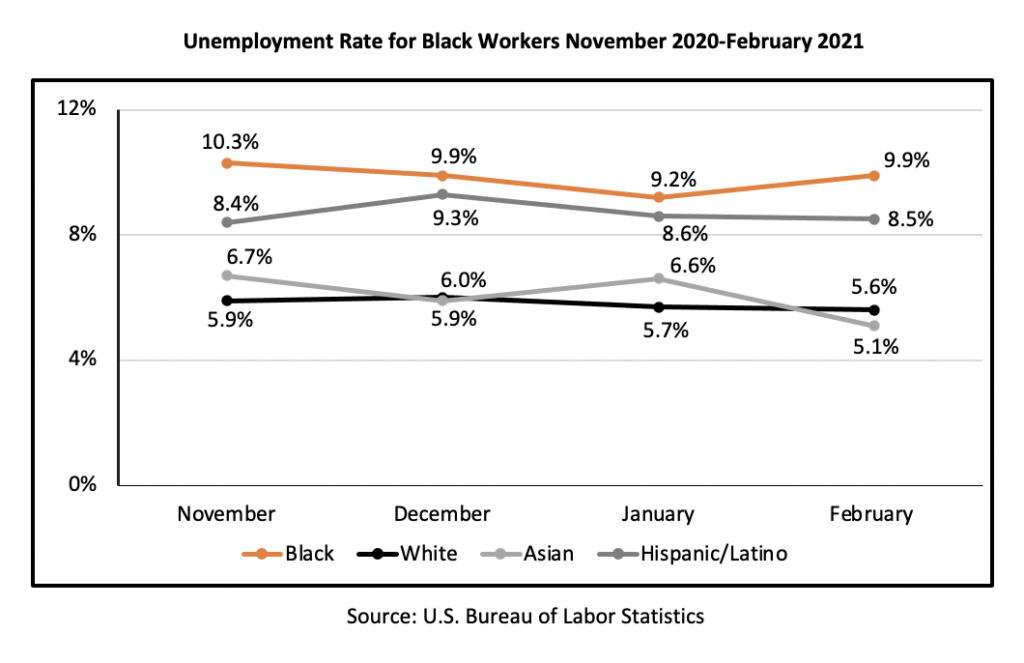
Economy strengthens: The addition of 379,000 jobs in February, compared to 49,000 jobs added last month, offers some grounds for optimism that the economy is getting stronger.
Public sector’s job engine: To rebuild the economy, strengthen the public sector, the Groundwork Collaborative argues, noting that Black people (18 percent) are more likely to work in government jobs than others (15 percent).
Rebuild infrastructure to rebuild the economy: New America calls for a jobs-centered recovery plan focused on America’s infrastructure, arguing that it would help replace the millions of jobs lost over the past 10 months, particularly for Black workers, who are among those at the highest risk of economic harm.
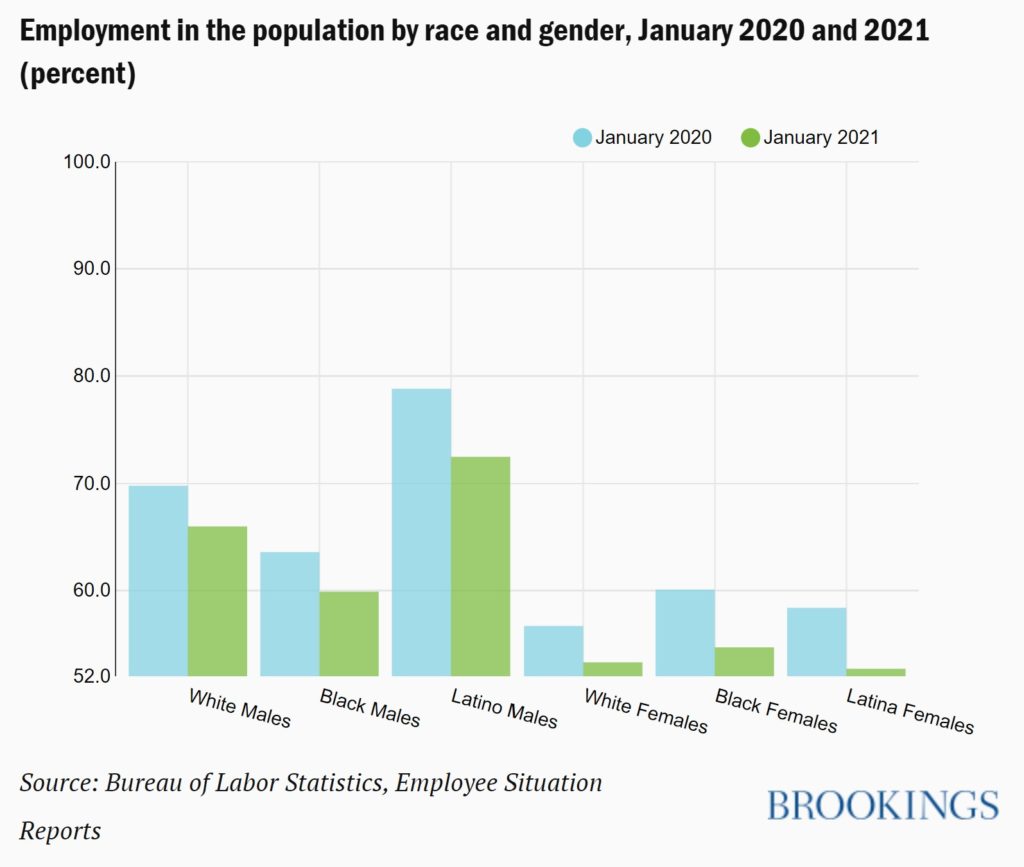
Why Black men struggle to find work: The Brookings Institution explores why Black men have the lowest employment rates and how policymakers can help to rectify the problem.
Gender wage gap narrows, but not for good reasons: The median weekly earnings for Black women were 63.6 percent that of white men in 2020. Latinas’ earnings were 58.7 percent of white men’s, while white women earning 79.6 percent and Asian women 95.2 percent that of white men, according to the Institute for Women’s Policy Research. The shrinking wage gaps were largely a result of job losses for women in the lowest wage jobs.
Minimum wage is women: Black women (39 percent) and Latinas (46 percent) are highly likely to earn less than $15 per hour, according to the Washington Post.
Getting what you pay for? Social Security has likely redistributed taxes paid from Black and Hispanic people to white people. In a new report, the Urban Institute offers Social Security reform proposals to better target the needs of Black and Hispanic people and eliminate old-age poverty overall.
Black businesses at the brink: Despite recent changes to the Paycheck Protection Program (PPP), Black business owners still need more reforms and assistance to survive the pandemic. PBS reports that an AP analysis found that during the first round of PPP funding, loans were approved in the 20 percent of ZIP codes with the highest proportions of white residents at double the rate as approvals in the 20 percent of ZIP codes with the lowest proportion of white residents.
Tech Policy
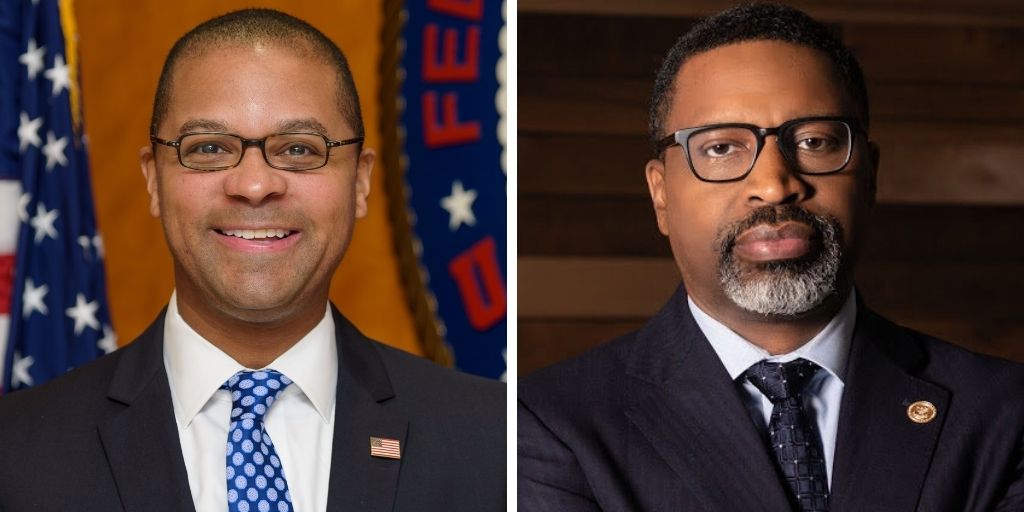
FCC Commissioner Starks partners with NAACP President on an equitable broadband future: In a CNN op-ed, FCC Commissioner Geoffrey Starks (pictured left) and NAACP President and CEO Derrick Johnson (pictured right) argue that to “address the racial and economic impact of the digital divide,” we must “build an equitable broadband future for all.” Commissioner Starks and Mr. Johnson note that “if we do not adequately address all sides of the digital divide—equitable deployment of broadband infrastructure, affordable connectivity, digital readiness training and access to connected devices—we will undoubtedly fail the American people.” Last April, the Joint Center hosted a virtual briefing with Commissioner Starks to discuss a “connectivity stimulus.”
States take charge in data privacy: In the absence of federal privacy legislation, Virginia has become the second state to adopt legislation to provide data protections to consumers. Residents can now opt out of having their data collected and sold. They can see, correct, or delete personal data companies collected, and they can require organizations to ask permission before collecting racial and other personal information.
Fraud protections: The Brookings Institution recommends reforms to strengthen the Federal Trade Commission, including reinforcing and expanding a program to protect Black and other vulnerable communities from data privacy concerns, racial profiling, and discrimination.
Tech equity: What began as a disputed firing of the Black co-lead of the artificial intelligence ethics team at Google has evolved into a campaign for greater diversity, inclusion, and equity in the tech industry. Black people compose only 2.4 percent of technical employees at Google, 1.7 percent at Facebook, and 3.6 percent at Microsoft. The lack of diversity among data scientists and ethicists critically examining the social and ethical risks of tech calls into question whether the discriminatory impacts of artificial intelligence are being investigated thoroughly.
Future of Work
Remote learning’s benefits: While virtual learning presents significant challenges for Black students, it may also offer advantages by allowing some students to thrive in an educational system historically unsupportive of them.
Apprenticeships for good jobs: Calling for an apprenticeship system to provide the experience and training that workers will need to gain and keep jobs, the Brookings Institution suggests ways to leverage apprenticeships to counter the underrepresentation of Black people employed in high-wage occupations.
Protecting workers as jobs transform: A study exploring future trends in employment cites a need for greater protections for workers vulnerable to a shift from industrial to service and knowledge-based jobs, the offshoring of jobs, and job automation.
COVID-19
PSAs not reaching Black people: New data indicate that racial disparities exposed by the COVID-19 pandemic extend to how information is shared on social media. According to The Markup’s Citizen Browser Project, only 3 percent of Black people among more than 2,500 Facebook users were shown information about the coronavirus, vaccines, and related issues from public health agencies. By comparison, 6.6 percent of white, 6.7 percent of Latina/o, and 9.5 percent of Asian Americans saw such information.
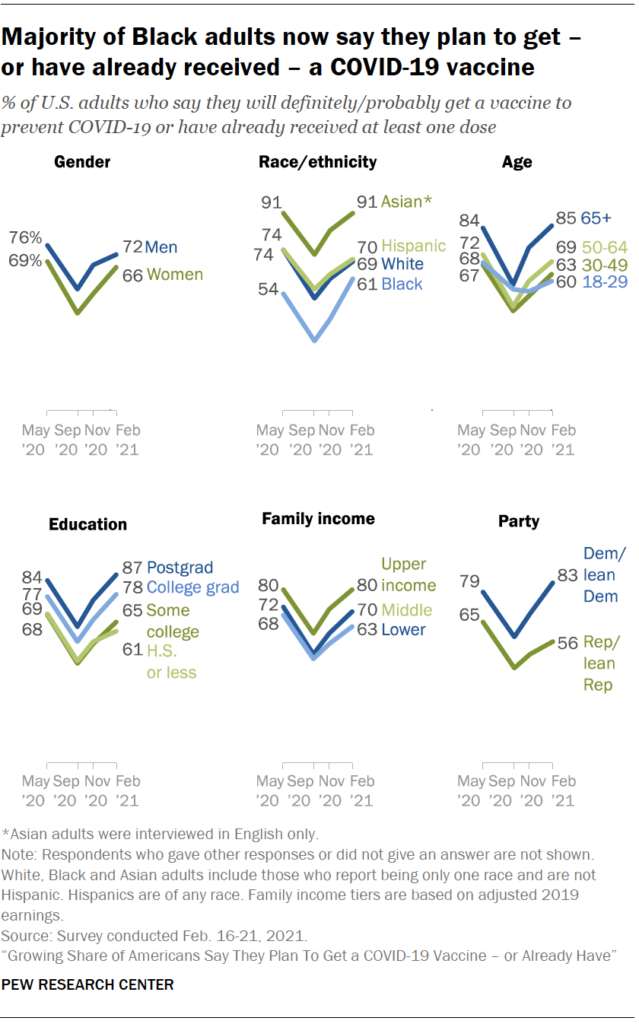
Vaccination acceptance climbs: A growing proportion of Americans intend to get vaccinated against the COVID-19 virus. Sixty-nine percent of all Americans have been vaccinated or say they will definitely or probably get vaccinated. Sixty-one percent of Black Americans, up from 42 percent in November, say they planned to get vaccinated.
Vaccinations miss Black elderly: The rate of coronavirus vaccinations lags among older Black people compared with elderly white people in South Carolina and Washington state, despite facing triple the risk of dying from COVID-19. Challenges include lack of internet access or unfamiliarity with technology.
Illinois fights vaccine disparities: Illinois has launched a $10 million campaign to counter resistance to COVID-19 vaccinations in Black communities. While almost 8 percent of vaccine doses have gone to Black residents, they comprise 14.6 percent of the state population.
Blaming the victims: Despite assertions from Maryland’s governor that Black people do not want to be vaccinated against COVID-19, the real reason, say local, state, and federal leaders is a decentralized sign-up system that creates obstacles for thousands of Black people who want the shots. Black people represent 31 percent of Maryland’s population but only 16 percent of vaccine recipients for whom race has been reported.
Line-jumping by the privileged: In Florida’s Palm Beach County, rural Black communities are losing out to wealthier white communities in accessing COVID-19 vaccinations. Black people make up 18 percent of county residents but only 4.1 percent of those vaccinated as of March 1.
Stepping up when called: A group of Black women doctors and health advocates on the frontlines of the coronavirus pandemic share why they made personal and professional sacrifices to administer vaccines, provide testing, and work to develop effective vaccines.
Political Studies
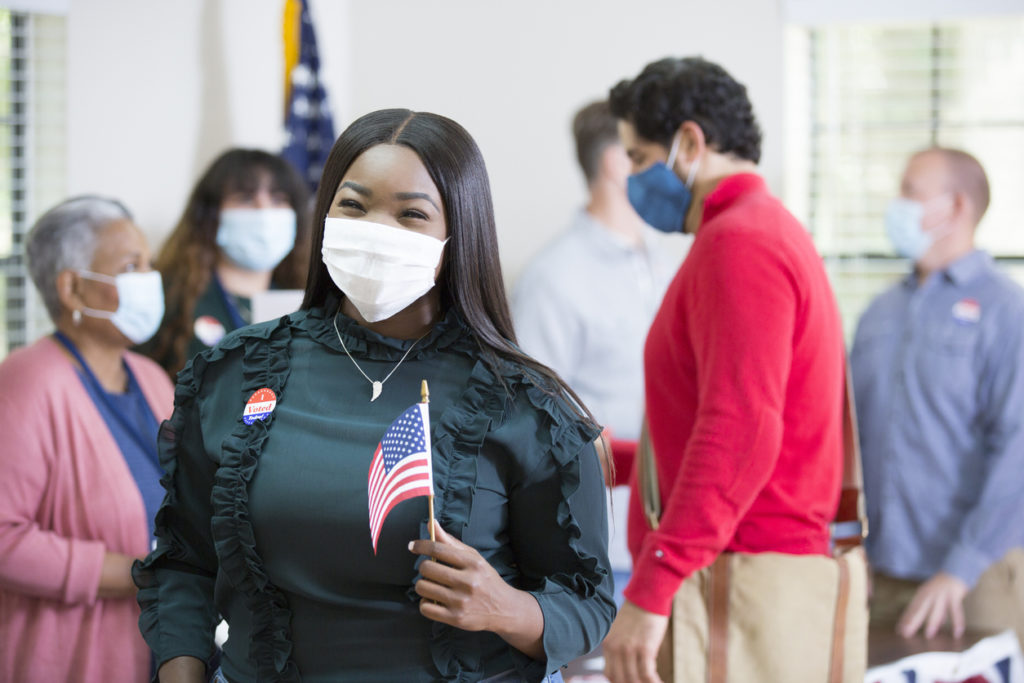
Black women shape elections: A tribute to women as change leaders in America points to Black women as the voting bloc that drove both of President Barack Obama’s victories in 2008 and 2012 and carried President Joe Biden into the White House with their voter registration, organization, and mobilization efforts.
Voting rights under siege: Two voter suppression bills in Georgia that target Black voters are gaining momentum, according to Nsé Ufot, a voting rights advocate and CEO of The New Georgia Project. She says these bills will wipe out the electoral margins seen in November.
Water still not flowing: Thousands of residents in Jackson, MS, a city that is 80 percent Black, have been without water for more than two weeks due to damage to the city’s water systems from historic winter storms.
Hill Diversity

Ossoff shows leadership on diversity: The Joint Center commended U.S. Senator Ossoff (D-GA) for hiring Donni Turner (pictured right) as legislative director in his personal office. Following this hire, African Americans account for 10 (2.9 percent) of the approximately 340 top Senate staffers in Washington, DC who serve as chiefs of staff, legislative directors, communications directors, or full committee staff directors (African Americans account for over 13 percent of the U.S. population). Of the 10 Black top staff in the U.S. Senate, two work for Republicans and seven work for Democrats.
Report card on top staff diversity of newly-elected Members: As of March 8, the Joint Center’s report card tracking top staff hires by each new Member in the 117th Congress illustrates that 206 of 213 (or 96.7 percent) of the possible positions have already been filled. Of Members who have hired all three top spots, so far Alex Padilla (D-CA) leads in the Senate and Marilyn Strickland (D-WA) leads in the House. Those at the bottom of the lists are Senator Mark Kelly (D-AZ) and Rep. Troy Nehls (R-TX). Of the top staff hired by new Members so far, 24.8 percent are people of color and 5.8 percent are African American. People of color account for 40 percent of the U.S. population and African Americans account for 13.4 percent of the U.S.
Axios on Hill diversity: The Joint Center’s report, Racial Diversity Among Top Senate Personal Offices, was referenced in an Axios article discussing the importance of diverse top staff and diversity in lobbying and government relations jobs. Joint Center Board Member Paul Thornell was quoted explaining several reasons for the lack of Hill staff diversity saying “[i]t’s a pipeline problem.” Thornell further explained, “[w]e do see some bias on the lack of people of color in top jobs in the Senate, and that leads to fewer opportunities in downtown lobbying jobs.”
Movement Building
Color of Change issues a petition demanding the Department of Justice to investigate the Rochester Police Department for patterns and practices of civil rights violations after newly released footage shows a police officer pepper-spraying a Black woman and her 3-year-old child.
Firelight Media, FRONTLINE, and WORLD Channel present “Death is Our Business,” a short documentary detailing how Black funeral homes have dealt with the devastating impact of COVID-19 on New Orleans.
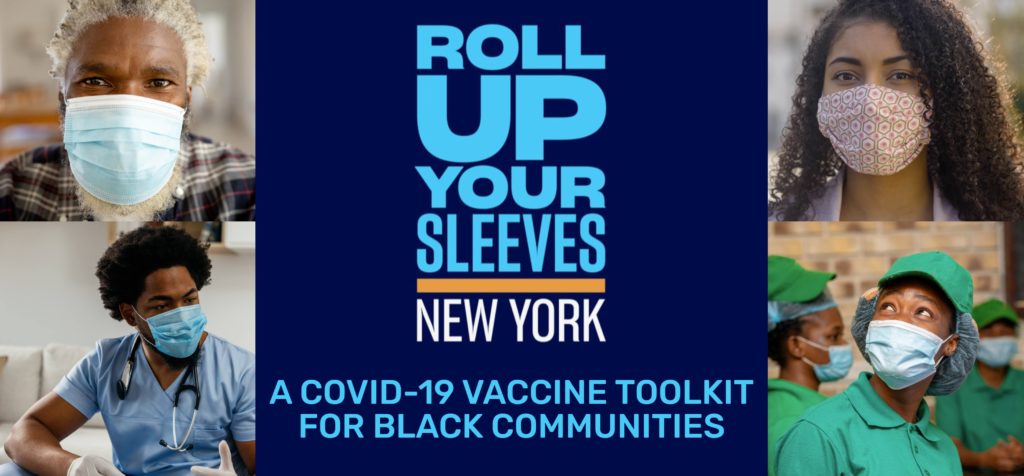
National Urban League President and CEO Marc Morial, Rev. Al Sharpton, and former Ohio State Senator Nina Turner partner with the Federation of Protestant Welfare Agencies (FPWA) to launch the COVID-19 Vaccine Toolkit for Black Communities.
SisterLove, Inc., provides free COVID-19 and HIV testing in Atlanta on National Woman and Girls HIV/AIDS Awareness Day.
The Washington Post highlights Black women throughout history who changed America’s future and paved the way for Vice President Kamala Harris.
Events
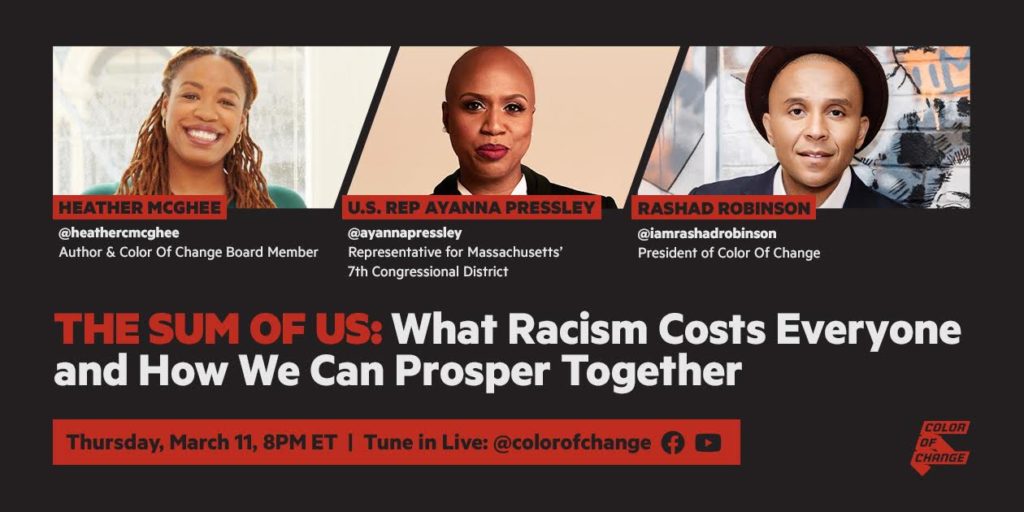
Upcoming events include “The Sum of Us: What Racism Costs Everyone and How We Can Prosper Together” (Color of Change, March 11); “How hate and harassment in online gaming influence civic life”(Brookings Institution, March 15);“Can family engagement be a gamechanger for education post-COVID?” (Brookings Institution, March 16); “How the COVID-19 pandemic has impacted higher education” (Brookings Institution, March 16); “One Year into the Pandemic: New Evidence on How Small Businesses Are Faring” (Urban Institute, March 16); “The Invisible Tax: Educators of Color and the Water They Carry” (The Hunt Institute, March 16); “Reimagining What it Means to Engage Employers” (Jobs for the Future, March 18).
Last week, events were held by Brookings Institution, Greenpeace USA, Lumina Foundation, NAACP Legal Defense and Educational Fund Inc., National Committee for Responsive Philanthropy, New America, Poor People’s Campaign, The Hunt Institute, UC Berkeley, and the Urban Institute.
Podcasts
How Do Biased Algorithms Damage Marginalized Communities? (Delaware Public Media)
We’re using tech to solve all our problems. But plenty of people still have problems with the tech (NPR Marketplace Tech)
The Joint Center thanks the Annie E. Casey Foundation, the Boulé Foundation, the Democracy Fund, Toyota Motor North America, Inc., UPS, and the Walmart Foundation for additional support that has allowed us to do some of our COVID-19 and Black Communities work.
To receive the Joint Center’s emails, sign-up here.

